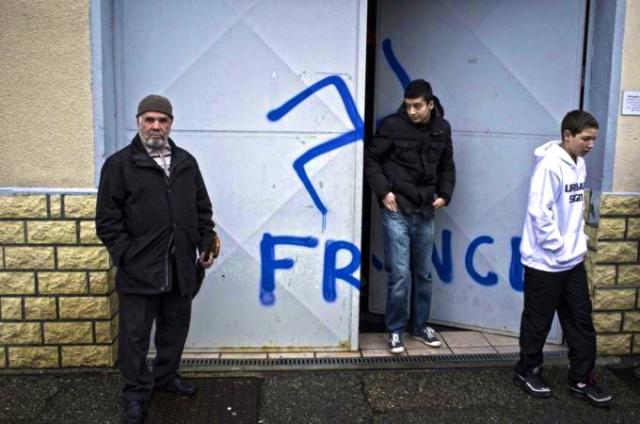
On May 17, a proposal was passed in the National Assembly that effectively removes the words "race" and "racial" from the French Penal Code, nearly nine years after the same body passed the "headscarf ban" and banned conspicuous displays of religion in the public sphere.
The recent race-ban legally broadens the racist and xenophobic aims of the 2004 headscarf ban, putting to rest France's formal commitment to multiculturalism. And, despite being formally erased, the ban emboldens discrimination towards racial and religious minorities.
To be French, according to laicite and the newly introduced "race-ban", mandates the shedding of religious and now racial identity. In short, the race-ban caps a legal regime that compels immigrants to assimilate into a linear and exclusive form of French identity, or face increased marginalisation and societal exclusion.
Multicultural or hyphenated identities, such as Algerian-French or Senegalese-French, are put to rest by the proposal. With the former, native identities viewed as alien to the codification of a monolithic, mutually exclusive and Meursault-like embodiment of French citizenship. Namely, this brand of citizenship is fatal to Arab or Amazigh, Muslim or Malian, and other racial and religious halves of hyphenated identities that once hallmarked France's embrace of religious and racial pluralism.French diversity extends along both religious and racial lines. Despite this heterogeneity, the government's theoretical institutionalisation of colour blindness steers its public policy. "Race", and its emanations, was not only a taboo subject in political discourse, but also reminder of France's past racial and ethnic atrocities.
In addition to erasing the racial missteps of the past from the nation's collective memory, which includes the Nazi-abetting Vichy-era and the brutal colonisation of Algeria, French colour blindness turns a blind eye to present-day public and private racism.
If historic racism is eliminated from national memory, then redressing present racial discrimination is also illegal. Race-conscious remedies of racial and ethnic discrimination are illegal in France. Similarly, "affirmative action" programmes seeking to integrate under-represented Frenchmen and women of colour into educational and employment institutions are also preempted by state-endorsed colour blindness.
Challenging Discrimination In An Irreligious and Race-Less France
Removing race from the law books does not erase French racism within government halls and on its streets. In fact, the race-ban intersects with a moment of rapidly rising racism in France. The French Consultative Commission on Human Rights (CNCDH) reported that "racist acts reported to the police rose by more than 23 percent in 2012".
This alarming spike in reported racism - which, naturally, does not include all those acts of discrimination and violence which go unreported - highlights a greater need for formal engagement of race and racism on part of local and federal officials. However, with the race-ban, the federal government has taken the opposite course of action.
The same study also measured the growing tide of xenophobia and Islamophobia in France. The CNDCH poll reported that "55 percent of respondents said that the practice of Islam should not be encouraged in France and that Muslims form a group apart in society". Another study conducted a survey whereby 60 percent of French society - even after the headscarf ban - believed the "visibility of Islam in France to be too great".These studies highlight the still rising ethnocentric and exclusionary tide in France. Again, proponents of a European and secular France in halls of power and on the ground are echoing a common message -assimilate, or else.
Imposed assimilation and colour blindness is also fuelled by the growing cries of "anti-white racism" in France. A case involving an Arab attacker and white victim has captured the attention of the French public, amplifying the "reverse discrimination" movement. This element, which champions the assimilation-or-else model, contends that the growing minority element in France is not only threatening its European identity, but also the physical well-being of its white population.
The International League against Racism and Anti-Semitism, supporting the prosecution of the Arab defendant in the "anti-white racism trial", distinguished the harm experienced by the plaintiff from the discrimination endured by racial minorities.A Discriminatory Rage Shared By Law
Laicite wedded with its ideological spouse, the race-ban, will spawn a horrific existence for minorities during this current moment of rising racism and xenophobia. Racial discrimination cannot be reported to official authorities that deem it non-existent and invisible, which in turn, will embolden extremists in France to discriminate and intimidate freely - without punishment.
This "shared racist rage by law" harmonises the disparate impact of nativist government legislation and proliferating popular xenophobia, which creates an insufferable existence for religious and racial minorities in France - in particular, segments of society enduring the intersecting stigma of religious and racial invisibility.
The race-ban will equip the swelling throngs of France's Meursaults to take the race-ban into their own hands. Removing race from the law books will mobilise racists to combat its living manifestations on France's streets, and threaten those whose very existence defies the racial invisibility imagined by the law.
"Killing an Arab" without punishment will be more than lifeless words of Camus fiction following the race-ban, but a heightening reality, emboldened by the new letter of the law.




No comments:
Post a Comment